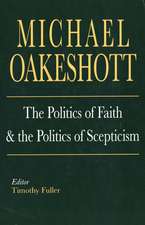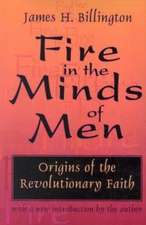Fascism: The Career of a Concept
Autor Paul E. Gottfrieden Limba Engleză Paperback – 20 oct 2017
What does it mean to label someone a fascist? Today, it is equated with denouncing him or her as a Nazi. But as intellectual historian Paul E. Gottfried writes in this provocative yet even-handed study, the term’s meaning has evolved over the years. Gottfried examines the semantic twists and turns the term has endured since the 1930s and traces the word’s polemical function within the context of present ideological struggles. Like “conservatism,” “liberalism,” and other words whose meanings have changed with time, “fascism” has been used arbitrarily over the years and now stands for a host of iniquities that progressives, multiculturalists, and libertarians oppose, even if they offer no single, coherent account of the historic evil they condemn.
Certain factors have contributed to the term’s imprecise usage, Gottfried writes, including the equation of all fascisms with Nazism and Hitler, as well as the rise of a post-Marxist left that expresses predominantly cultural opposition to bourgeois society and its Christian and/or national components. Those who stand in the way of social change are dismissed as “fascist,” he contends, an epithet that is no longer associated with state corporatism and other features of fascism that were once essential but are now widely ignored. Gottfried outlines the specific historical meaning of the term and argues that it should not be used indiscriminately to describe those who hold unpopular opinions. His important study will appeal to political scientists, intellectual historians, and general readers interested in politics and history.
Certain factors have contributed to the term’s imprecise usage, Gottfried writes, including the equation of all fascisms with Nazism and Hitler, as well as the rise of a post-Marxist left that expresses predominantly cultural opposition to bourgeois society and its Christian and/or national components. Those who stand in the way of social change are dismissed as “fascist,” he contends, an epithet that is no longer associated with state corporatism and other features of fascism that were once essential but are now widely ignored. Gottfried outlines the specific historical meaning of the term and argues that it should not be used indiscriminately to describe those who hold unpopular opinions. His important study will appeal to political scientists, intellectual historians, and general readers interested in politics and history.
| Toate formatele și edițiile | Preț | Express |
|---|---|---|
| Paperback (1) | 271.39 lei 6-8 săpt. | |
| Northern Illinois University Press – 20 oct 2017 | 271.39 lei 6-8 săpt. | |
| Hardback (1) | 719.53 lei 6-8 săpt. | |
| Northern Illinois University Press – 8 feb 2016 | 719.53 lei 6-8 săpt. |
Preț: 271.39 lei
Nou
Puncte Express: 407
Preț estimativ în valută:
51.93€ • 54.36$ • 42.97£
51.93€ • 54.36$ • 42.97£
Carte tipărită la comandă
Livrare economică 07-21 aprilie
Preluare comenzi: 021 569.72.76
Specificații
ISBN-13: 9780875807829
ISBN-10: 0875807828
Pagini: 256
Dimensiuni: 152 x 229 x 18 mm
Greutate: 0.32 kg
Ediția:1
Editura: Northern Illinois University Press
Colecția Northern Illinois University Press
ISBN-10: 0875807828
Pagini: 256
Dimensiuni: 152 x 229 x 18 mm
Greutate: 0.32 kg
Ediția:1
Editura: Northern Illinois University Press
Colecția Northern Illinois University Press
Recenzii
"Paul Gottfried's is far and away the best book on fascism I've read in many years."
—Michael Ledeen, Claremont Review of Books
“Gottfried’s study is particular, nuanced, and multifaceted . . . a model for the type of work that can earn the right a hearing from more attentive audiences.”
—The American Conservative
"For historians, [Fascism] offers clear and provocative insights and arguments, and the very detailed notes are especially helpful. . . . Recommended."
—CHOICE
“Fascism is a meticulously researched primer on the true history of one of the world’s worst ideologies. Upon finishing the book, readers will emerge with a firmer understanding of history, philosophy, and the ways in which words shape culture and reality.”
—Jay Lehr, The Heartland Institute
“Gottfried brings vast erudition and interpretive nuance to the subject of fascism. This book is a significant contribution to the fields of political thought and European history.”
—Jeff Taylor, Dordt College
“Fascism is a book of remarkable scholarship and sensitivity regarding some exceedingly complex ideas. Gottfried’s navigation of the ins and outs of the interwar ideological quarrels in Italy and France is especially masterful.”
—Robert Weissberg, emeritus, University of Illinois at Urbana–Champaign
—Michael Ledeen, Claremont Review of Books
“Gottfried’s study is particular, nuanced, and multifaceted . . . a model for the type of work that can earn the right a hearing from more attentive audiences.”
—The American Conservative
"For historians, [Fascism] offers clear and provocative insights and arguments, and the very detailed notes are especially helpful. . . . Recommended."
—CHOICE
“Fascism is a meticulously researched primer on the true history of one of the world’s worst ideologies. Upon finishing the book, readers will emerge with a firmer understanding of history, philosophy, and the ways in which words shape culture and reality.”
—Jay Lehr, The Heartland Institute
“Gottfried brings vast erudition and interpretive nuance to the subject of fascism. This book is a significant contribution to the fields of political thought and European history.”
—Jeff Taylor, Dordt College
“Fascism is a book of remarkable scholarship and sensitivity regarding some exceedingly complex ideas. Gottfried’s navigation of the ins and outs of the interwar ideological quarrels in Italy and France is especially masterful.”
—Robert Weissberg, emeritus, University of Illinois at Urbana–Champaign
Notă biografică
Paul E. Gottfried is the retired Horace Raffensperger Professor of Humanities at Elizabethtown College and a Guggenheim recipient. He is the author of numerous books, including The Search for Historical Meaning (NIU Press, 2010) and, most recently, Leo Strauss and the Conservative Movement in America.
Descriere
Descriere de la o altă ediție sau format:
What does it mean to label someone a fascist? Today, it is equated with denouncing him or her as a Nazi. But as intellectual historian Paul E. Gottfried writes in this provocative yet even-handed study, the term s meaning has evolved over the years. Gottfried examines the semantic twists and turns the term has endured since the 1930s and traces the word s polemical function within the context of present ideological struggles. Like conservatism, liberalism, and other words whose meanings have changed with time, fascism has been used arbitrarily over the years and now stands for a host of iniquities that progressives, multiculturalists, and libertarians oppose, even if they offer no single, coherent account of the historic evil they condemn. Certain factors have contributed to the term s imprecise usage, Gottfried writes, including the equation of all fascisms with Nazism and Hitler, as well as the rise of a post-Marxist left that expresses predominantly cultural opposition to bourgeois society and its Christian and/or national components. Those who stand in the way of social change are dismissed as fascist, he contends, an epithet that is no longer associated with state corporatism and other features of fascism that were once essential but are now widely ignored. Gottfried outlines the specific historical meaning of the term and argues that it should not be used indiscriminately to describe those who hold unpopular opinions. His important study will appeal to political scientists, intellectual historians, and general readers interested in politics and history."
What does it mean to label someone a fascist? Today, it is equated with denouncing him or her as a Nazi. But as intellectual historian Paul E. Gottfried writes in this provocative yet even-handed study, the term s meaning has evolved over the years. Gottfried examines the semantic twists and turns the term has endured since the 1930s and traces the word s polemical function within the context of present ideological struggles. Like conservatism, liberalism, and other words whose meanings have changed with time, fascism has been used arbitrarily over the years and now stands for a host of iniquities that progressives, multiculturalists, and libertarians oppose, even if they offer no single, coherent account of the historic evil they condemn. Certain factors have contributed to the term s imprecise usage, Gottfried writes, including the equation of all fascisms with Nazism and Hitler, as well as the rise of a post-Marxist left that expresses predominantly cultural opposition to bourgeois society and its Christian and/or national components. Those who stand in the way of social change are dismissed as fascist, he contends, an epithet that is no longer associated with state corporatism and other features of fascism that were once essential but are now widely ignored. Gottfried outlines the specific historical meaning of the term and argues that it should not be used indiscriminately to describe those who hold unpopular opinions. His important study will appeal to political scientists, intellectual historians, and general readers interested in politics and history."












